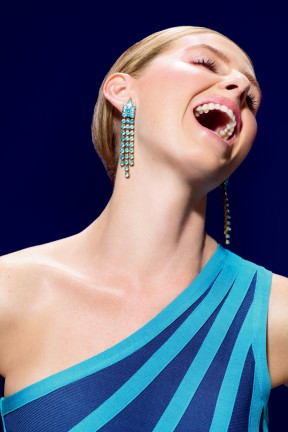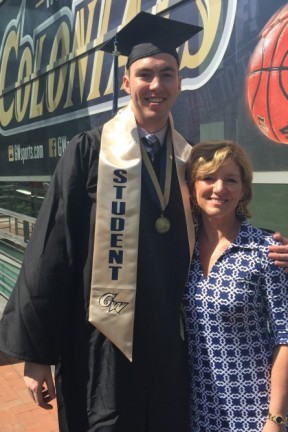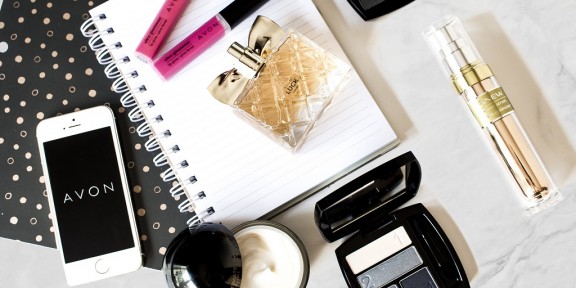‘Silence Speaks Louder Than Words’ When It Comes To Men’s Role In Ending Gender-Based Violence, Says Human Rights Expert Cindy Dyer
EmpowermentWomen are great advocates for each other, but where do men fit in to the gender equality movement?
According to Cindy Dyer, Vice President of Human Rights at Vital Voices, our collective journey towards peace and prosperity relies on more men speaking up. Especially when it comes to ending gender-based violence, men have an opportunity to improve their communities by initiating more conversations. What doesn’t help anyone? Silence.
Read on for our interview with Cindy Dyer, and as Father’s Day approaches, we encourage you to ask the dads you know to take a stand.
When it comes to men’s role in helping to end gender-based violence, why is inaction — that is, refraining from intervening or initiating a conversation — an issue?
I think some men (and even women, too) are reluctant to get involved because they think, “It’s not my business,” or “I don’t know for sure” — meaning, they’re not sure there is domestic violence taking place. But where there’s smoke, there’s fire. It’s not enough to just talk to the victim. If you want to stop the violence, you have to talk to the person committing violence. It’s an essential conversation. And I think the best people to have that conversation are strong, non-violent men. If there is silence, then the abuser hears affirmation. So, that’s what we have to stop.
Are these men you’re referring to lawyers and policemen?
It’s ordinary men who I’m talking about — our friends and our colleagues. When lawyers and policemen get involved, it’s already escalated. These conversations need to happen earlier. Will it be a comfortable conversation? Absolutely not. But we need to find a way to do it because we care about these people. For example, if you have a friend who’s drunk and wants to drive a car, a conversation needs to happen and those keys need to be taken. You may not be certain of how many drinks he’s had, and you may not be certain he will get into an accident — but merely being suspicious is enough to confiscate the keys. Similarly, when it comes to domestic violence, you just wouldn’t want to run the risk by not stepping in. Talk to him. Express concern.
Over your career, have you witnessed men’s attitudes towards women’s rights changing?
We’re not where we should be, but based on my personal experience, I’ve seen a definite improvement in terms of the need to have respect and non-violence towards women. There is a sort of peer pressure now around non-violence, similar to the way we saw changes in attitudes towards racism decades ago. And that’s the best use of peer pressure, a collective “we can’t be this way anymore.” Thanks to peer pressure, the wheels of change have begun to turn, and they’re not going to turn back. They may need to turn faster, but there’s always forward momentum.
Let’s step back. In your own words, why is it important that women and men have equal rights?
It’s simple: When women have equal rights and opportunities, the whole community improves. Not just women, but children and men as well. Families do better economically when they are free from violence; children graduate from school at greater rates. As they say, no country can get ahead when half of its people are left behind.

Uzra Zeya, Acting Assistant Secretary of State for Democracy, Human Rights and Labor, Alyse Nelson, President and CEO of Vital Voices Global Partnership, Fergie, Avon Foundation Global Ambassador, William Burns, Deputy Secretary of State, and Sheri McCoy, Chairman and CEO of Avon Products, Inc. celebrate the launch of the Global Partnership to End Violence Against Women at the U.S. Department of State, 2014.
Who are some advocates in this space — men advocating for women — who you admire?
There are several. The Kant brothers in India have created an NGO called Shakti Vahini to end violence against women and girls. They’re amazing. Clearly their mother did something right. Each of the brothers has daughters, and each plays to their strength. They’re just great.
Dean Peacock and Bafano Khumalo have created an organization called Sonke Gender Justice. They are doing similar work to the Kant brothers, but with a program that’s unique to South Africa.
In the U.S., they are lucky to have Neil Irvin, who is taking this idea of peer pressure among youth and using it to create positive change. After all, it’s much easier to raise non-violent boys than to change the behaviors of violent men. His organization is called Men Can Stop Rape. Then there’s Gary Barker, who has perhaps done more than anyone in the world on this issue. He’s created a global alliance called MenEngage in addition to Instituto Promundo in Brazil. He’s not focusing only on violence against women — he’s focusing on gender inequity at large. He has a completely holistic outlook that involves education, childcare, reproductive health — a number of things.
Before Vital Voices, you were a prosecutor in Dallas, Texas. Why did you give up prosecuting serious felony and murder cases to work in the area of family violence?
It was really for three reasons. The first was, I just thought it needed to be done. If not me, then who? Number two: I really enjoy working on these cases. I loved explaining the system. So, I thought maybe making the change wouldn’t be great for my career, but at least it would make me happy. As it turns out, it really did help my career in ways that I couldn’t have imagined. And three: Prosecuting murder cases is important, but preventing murder cases is a gift that shouldn’t be dismissed.
Vital Voices is an international NGO supported by the Avon Foundation that was founded by Hillary Clinton and Madeleine Albright. Vital Voices works with women leaders in the areas of economic empowerment, political participation and human rights. Through 2014, Avon global philanthropy, led by the Avon Foundation, has donated nearly $1 billion in more than 50 countries for causes most important to women. Visit www.avonfoundation.org for more information.


